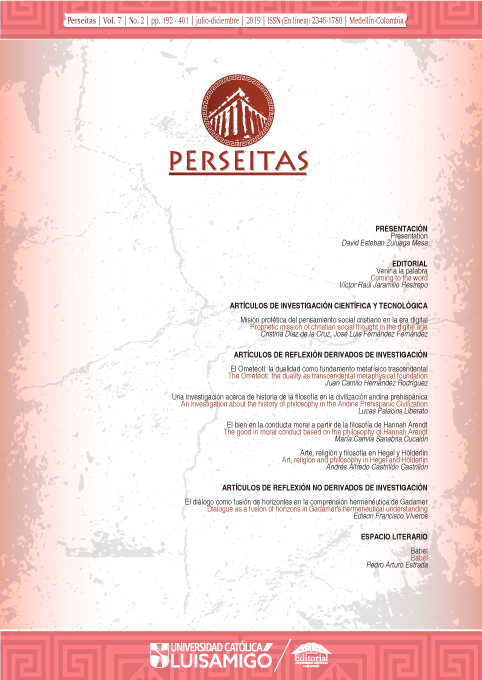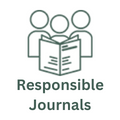Misión profética del pensamiento social cristiano en la era digital
DOI:
https://doi.org/10.21501/23461780.3295Palabras clave:
Doctrina Social de la Iglesia, Desarrollo humano integral, Toma de decisiones, Ética empresarial, Antropología.Resumen
La Iglesia Católica ha desarrollado, fundamentalmente a lo largo de las últimas décadas, un aporte significativo para la reflexión acerca de cómo construir relaciones políticas, económicas y sociales basadas en los valores del Evangelio, por el bien de la humanidad. En 1967 el Papa Pablo VI publicó la carta encíclica Populorum Progressio donde explicitaba las condiciones, desde la perspectiva de la Iglesia, para que pueda darse un verdadero desarrollo, indicando que “para que sea auténtico ha de ser integral, de todo el hombre y de todos los hombres” (n. 14). Desde la publicación de esta carta se han producido cambios significativos en el mundo empresarial, especialmente en relación con la globalización y el advenimiento de la llamada era digital. Sin embargo, las claves profundas de la propuesta de Pablo VI, de otros textos de la Doctrina Social de la Iglesia y de la antropología cristiana, siguen siendo actuales. El pensamiento social cristiano tiene por misión iluminar, a modo de profecía, la acción humana en este entorno, que sufre transformaciones cada vez más rápidas. Este estudio pretende ofrecer, desde la perspectiva cristiana, algunas claves que puedan servir de guía para la toma de decisiones, sobre todo para el entorno empresarial, en tiempos de cambios e incertidumbres propios de la llamada era digital. Como resultado, el artículo ofrece tres propuestas para la promoción del desarrollo humano integral en el contexto anteriormente citado: desenmascarar las ideologías, ofrecer un claro modelo de ser humano abierto a la transcendencia y fomentar la cooperación intergeneracional.
Descargas
Referencias
Bauman, Z. (2007). Liquid times: Living in an age of uncertainty. UK: Polity Press.
Benedicto XI (2009). Caritas in Veritate. Vaticano: Libreria Editrice Vaticana.
Besnier, J. (2013). Humanity: A failed experiment? Versions of trans-humanism. [L'humanité: Une expérience ratée?: Versions du transhumanisme] Futuribles: Analyse et Prospective, (397), 5-20.
Camacho, I. (2017). Populorum progressio: Desarrollo integral y humanismo cristiano. Veritas: Journal of Philosophy & Theology, (37), 123-148.
Concilio Vaticano II (1965). Gaudium et spes. Recuperado de: http://www.vatican.va/archive/hist_councils/ii_vatican_council/documents/vat-ii_const_19651207_gaudium-et-spes_sp.html.
Cooney, B. (2003). Posthumanity: Thinking philosophically about the future. Maryland: The Rowman and Littefield.
Deloitte. (2017). Deloitte global human capital trends: Rewriting the rules for the digital age. Deloitte University Press. Recuperado de: https://www2.deloitte.com/content/dam/Deloitte/global/Documents/HumanCapital/hc-2017-global-human-capital-trends-gx.pdf.
European Agency for safety and health at work. (2015). European survey of enterprises on new and emerging risks - managing safety and health at work (ESENER). Recuperado de https://osha.europa.eu/sites/default/files/ESENER2-Overview_report.pdf.
Francisco (2013). Evangelii Gaudium. Vaticano: Libreria Editrice Vaticana.
Francisco (2015). Laudato Si. Vaticano: Libreria Editrice Vaticana.
Frunza, S. (2017). Ethical leadership, religion and personal development in the context of global crisis. Journal for the Study of Religions and Ideologies, 16(46), 3-16.
Giovanola, B. (2009). Re-thinking the anthropological and ethical foundation of economics and business: Human richness and capabilities enhancement. Journal of Business Ethics, 88(3), 431-444.
doi:10.1007/s10551-009-0126-9.
Hopkins, P. D. (2012). Why uploading will not work, or, the ghosts haunting transhumanism. International Journal of Machine Consciousness, 4(1), 229-243. doi:10.1142/S1793843012400136.
Jothen, P. (2013). Transhumanism and transcendence: Christian hope in an age of technological enhancement - edited by Ronald Cole-Turner. Religious Studies Review, 39(2), 82.
Juan Pablo II (1981). Laboren Excercens. Vaticano: Libreria Editrice Vaticana.
Juan Pablo II (1991). Centesimus Annus. Vaticano: Libreria Editrice Vaticana.
Juan Pablo II (1991). Centesimus Annus. Vaticano: Libreria Editrice Vaticana.
Melé, D., & González Cantón, C. (2015). Fundamentos antropológicos de la dirección de empresas. Pamplona: EUNSA.
Pablo VI (1967). Populorum Progressio. Vaticano: Libreria Editrice Vaticana.
Pfeil, M. R. (2018). Fifty years after Populorum Progressio: Understanding integral human development in light of integral ecology. Journal of Catholic Social Thought, 15(1), 5-17.
Ratzinger, J. (1999). El problema de la profecía cristiana: Entrevista de Niels Christian Hvidt. Recuperado de: https://solidaridad.net/joseph-cardenal-ratzinger-acute-el-problema-de-la-profecia-cristiana-acute-1923/.
Rielo, F. (1986). Testamento espiritual. No publicado.
Rielo, F. (2011). El humanismo de Cristo. Madrid: F.F.R.
Rielo, F. (2012). Concepción mística de la antropología. Madrid: F.F.R.
Sennett, R. (1999). The corrosion of character. New York: W. W. Norton & Company.
Stichel, E. v., & Maeseneer, Y. d. (2015). Gaudium et Spes: Impulses of the spirit for an age of globalisation. Louvain Studies, 39(1), 63-79.
Tarique, I., & Schuler, R. S. (2010). Global talent management: Literature review, integrative framework, and suggestions for further research. Journal of World Business, 45(2), 122-133.
World Economic Forum. (2018). The future of jobs report 2018. Cologny / Geneva: World Economic Forum. Recuperado de: http://www3.weforum.org/docs/WEF_Future_of_Jobs_2018.pdf.
Publicado
Cómo citar
Número
Sección
Licencia
Derechos de autor 2019 Perseitas

Esta obra está bajo una licencia internacional Creative Commons Atribución-NoComercial-SinDerivadas 4.0.
La revista y los textos individuales que en esta se divulgan están protegidos por las leyes de copyright y por los términos y condiciones de la Licencia Creative Commons Atribución-No Comercial-Sin Derivar 4.0 Internacional.

















